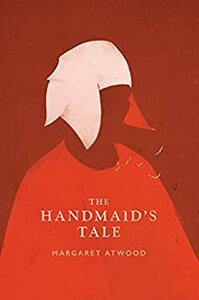Take a photo of a barcode or cover
dark
emotional
mysterious
challenging
dark
tense
medium-paced
Plot or Character Driven:
A mix
Strong character development:
Yes
Loveable characters:
Complicated
Diverse cast of characters:
Yes
Flaws of characters a main focus:
Complicated
C'est quand même bon, mais j'ai trouvé ça long à lire... Ça pris presque 400 pages, avant qu'il ne se passe quelque chose...
challenging
dark
emotional
reflective
sad
tense
slow-paced
Plot or Character Driven:
Character
Strong character development:
Complicated
Loveable characters:
Complicated
Diverse cast of characters:
Complicated
Flaws of characters a main focus:
Yes
Brilliant use of language; heart-wrenching storytelling. Atwood manages to frequently jump in time without it getting confusing for the reader. I was in Offred's head with her.
Graphic: Confinement, Death, Emotional abuse, Infertility, Infidelity, Misogyny, Rape, Sexism, Sexual content, Sexual violence, Slavery, Suicidal thoughts, Suicide, Torture, Violence, Blood, Police brutality, Antisemitism, Medical content, Kidnapping, Grief, Religious bigotry, Murder, Pregnancy, Classism, Deportation
Moderate: Animal death, Child death, Miscarriage, Abortion, Alcohol, War
Minor: Addiction, Gun violence, Homophobia, Mental illness, Vomit, Islamophobia, Death of parent, Schizophrenia/Psychosis , Lesbophobia
There is one pervasive feeling throughout this book - dread.
It is a masterpiece of literature, but also a warning. That's what makes good dystopia - elements of the world as it is today incorporated into a horrible world that could be. Atwood disassembles a brutal regime and through flashbacks of a main character does a great analysis of how regimes like that come to life often helped by a combination of catastrophies, "bread and circuses" handouts and lack of activity of citizens.
June was an ordinary woman before the Republic of Gilead. She didn't concern herself much about politics and what her mother, a political activist, said. Later on she often thinks of the past in terms of "taking things for granted". Most readers will probably recognize something of her in themselves or at least know someone who "doesn't do politics" and thinks human rights activists are kinda bored so they protest something. I'd say the book did not do a good job if it doesn't encourage you to think and reevaluate something - in that way, this one does a splendid work. What makes it even more frightening is that you can scroll down your Facebook feed and hear a prominent politician say something very similar to a line in the book.
The ending caught me off guard because I expected more, but the Historical Notes provide an optimistic opportunity, which is a great addition to the doom and gloom of previous pages. I'm not sure how much of my impression is helped by watching the show first (yeah, I know, a sacrilege, but I couldn't resist, and it's great). Maybe it made more sense of June's sometimes incoherent way of retelling. Anyway, now I turn to the show and I sure hope they do the book justice by added material.
It is a masterpiece of literature, but also a warning. That's what makes good dystopia - elements of the world as it is today incorporated into a horrible world that could be. Atwood disassembles a brutal regime and through flashbacks of a main character does a great analysis of how regimes like that come to life often helped by a combination of catastrophies, "bread and circuses" handouts and lack of activity of citizens.
June was an ordinary woman before the Republic of Gilead. She didn't concern herself much about politics and what her mother, a political activist, said. Later on she often thinks of the past in terms of "taking things for granted". Most readers will probably recognize something of her in themselves or at least know someone who "doesn't do politics" and thinks human rights activists are kinda bored so they protest something. I'd say the book did not do a good job if it doesn't encourage you to think and reevaluate something - in that way, this one does a splendid work. What makes it even more frightening is that you can scroll down your Facebook feed and hear a prominent politician say something very similar to a line in the book.
The ending caught me off guard because I expected more, but the Historical Notes provide an optimistic opportunity, which is a great addition to the doom and gloom of previous pages. I'm not sure how much of my impression is helped by watching the show first (yeah, I know, a sacrilege, but I couldn't resist, and it's great). Maybe it made more sense of June's sometimes incoherent way of retelling. Anyway, now I turn to the show and I sure hope they do the book justice by added material.
dark
reflective
tense
fast-paced
Plot or Character Driven:
A mix
Strong character development:
Complicated
Loveable characters:
No
Diverse cast of characters:
No
Flaws of characters a main focus:
Yes
dark
emotional
tense
slow-paced
Plot or Character Driven:
A mix
Strong character development:
Yes
Loveable characters:
Yes
Diverse cast of characters:
No
Flaws of characters a main focus:
No
dark
emotional
medium-paced
dark
mysterious
sad
tense
medium-paced
Plot or Character Driven:
Plot
Strong character development:
No
Loveable characters:
No
Diverse cast of characters:
No
Flaws of characters a main focus:
Yes
challenging
dark
reflective
tense
fast-paced
Plot or Character Driven:
A mix
Strong character development:
Complicated
Loveable characters:
No
Diverse cast of characters:
No
Flaws of characters a main focus:
Yes




